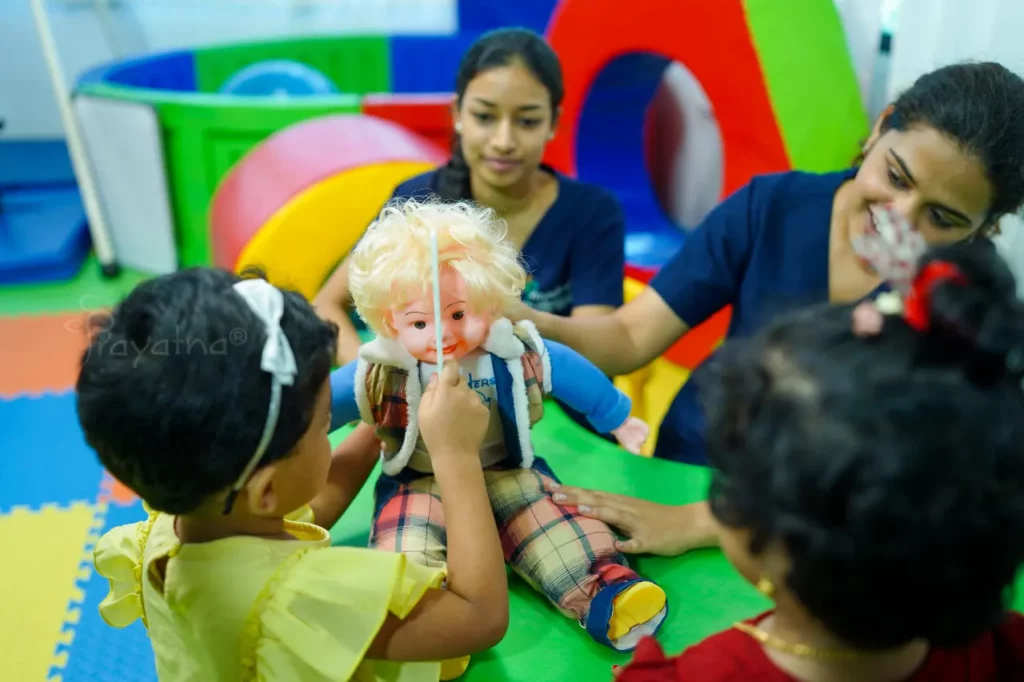
Written by
Divya Krishna
Rehabilitation Psychologist & Special Educator
MSc, MPhil Rehabilitation Psychology
Certified in Special Education (Learning Disability)
“Tell me and I forgot, teach me and I may remember, involve me and I learn”- Benjamin Franklin.
What is play?
Parents are highly motivated to give their child the best start in life in terms of appropriate interactions, social skills and emotional stability that will help them have good social circles. But due to time constraints and other reasons like school and family, parents are worried about providing the ‘right’ kind of environment to take part in events and expose them to situations. With rising social expectations and pressure among parents, one has to consciously give their child a good quality start.
If this is your worry and you are unsure about what you are getting yourself and your child into, play therapy can be your solution!
When asked to define play, parents’ response overwhelmingly focuses on fun. They also say that play could be outdoor or indoor, involving toys and imagination.
Play is essential in a child’s development in terms of cognitive, emotional and social learning.
Play therapy
Play has a vital role in children’s physical, psychological and psychosocial development and play therapy focuses precisely on this wholesome development of a child. Through play, parents can learn much about their children and their habits.
Play therapy is the dynamic process between the child and the play therapist in which the child explores at his/her own pace and with his/her own agenda those issues, past and current, conscious and unconscious, that affect the child’s life in the present. (British Association of Play Therapists, 2002).

Benefits of Using Play Therapy
Learn to explore the surroundings creatively while enhancing coping skills.
Develop an understanding of oneself, others and the dynamics of the world.
• Improve social interaction as play enhances communication and language skills leading to relationship building and bonding.
• Improve children’s fine and gross motor skills, eye-hand coordination, visuo-motor spatial skills, and strengthen their flexibility and endurance.
• Helps children to express feelings, thus reducing their stress and frustrations and enhancing their emotional well-being.
• Achievements and appreciation from others through play will increase their self-confidence and self-esteem and help in accepting future challenges.
• Learn how to be fun-loving and popular among others, how to laugh and find pleasure.
• Leads to other skills such as cooperation, sharing, waiting, turn-taking, helping, taking responsibilities, leadership, group skills, accepting failures, accepting others’ opinions, coping skills, problem-solving, decision-making, accepting own emotions and others as well.
• The social skills developed through play will sustain in the child throughout their life.
When Do We Use Play Therapy?
Although play therapy is mainly used for helping children between the ages of 3 and 12, people of all age groups can benefit from play therapy. Play therapy can be helpful in many circumstances, such as:
- Dealing with medical procedures, chronic illness or palliative care, developmental delays or learning disabilities.
• Managing aggressive or maladaptive behaviours in school.
• Family issues such as divorce, separation, or death of a close family member.
• Natural disasters or traumatic incidents, domestic violence, anxiety, depression and grief.
• Difficulties in self-help skills.
• Attention deficit hyperactive disorder (ADHD)
• Autism spectrum disorder (ASD)
How Does Play Therapy Work?
Play therapy may be non-directive or directive.
Nondirective play therapy believes that children have the potential to resolve their own issues if we allow optimal therapeutic conditions and the freedom to play. Directed play therapy involves more input from the therapist with faster therapeutic results.
Play must take place in an environment where the child feels safe and with only a few limitations. Therapists generally allow the child to play as they wish. As treatment progresses, they may introduce specific items or play activities related to the issues the child is facing.
They may use techniques that involve creative visualisation, story-telling, role-playing, toy phones, dolls, puppets, masks, arts and crafts, water and sand play, blocks and constructive toys, musical play, dance and exercises.
Play for Everyone : Children and Adult
While we expect children to play, adults too can explore the benefits of play. We must stop thinking of play as a silly, fun activity and permit ourselves to “act like a kid” again for some time. Play therapy can not only help address our health issues, but it can also provide a safe and comfortable environment that may allow an adult to approach more serious problems like dementia, grief and loss, post-traumatic stress, obsessions and compulsions, attention deficit hyperactivity, mood issues, anxiety, depression, developmental issues and emotional problems.
Key Principles
Play therapy works on this belief that a child has the ability to learn, develop and reach his/her full potential; they just need to be appropriately facilitated. We should always allow the child to lead the play and accept them as they are.
• Avoid saying “do” or “don’t”.
• Give choices to them and make them independent in expressing their feelings.
• Always make rules short and crisp.
• Use natural language.
• Quality time is much more significant than time quantity.
• Distractions such as television and phone should be monitored and controlled to improve the quality and reap the benefit of Play Therapy.
Let’s bring our children into the shared world….. Remember, “play is not a reward or a punishment but a process of learning”.

